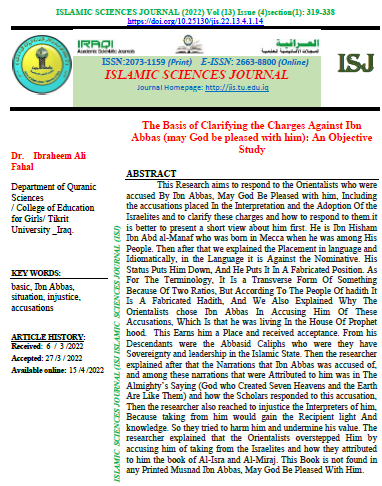The Basis of Clarifying the Charges Against Ibn Abbas (may God be pleased with him): An Objective Study
Main Article Content
Abstract
This Research aims to respond to the Orientalists who were accused By Ibn Abbas, May God Be Pleased with him, Including the accusations placed In the Interpretation and the Adoption Of the Israelites and to clarify these charges and how to respond to them.it is better to present a short view about him first. He is Ibn Hisham Ibn Abd al-Manaf who was born in Mecca when he was among His People. Then after that we explained the Placement in language and Idiomatically, in the Language it is Against the Nominative. His Status Puts Him Down, And He Puts It In A Fabricated Position. As For The Terminology, It Is a Transverse Form Of Something Because Of Two Ratios, But According To The People Of hadith It Is A Fabricated Hadith, And We Also Explained Why The Orientalists chose Ibn Abbas In Accusing Him Of These Accusations, Which Is that he was living In the House Of Prophet hood. This Earns him a Place and received acceptance. From his Descendants were the Abbasid Caliphs who were they have Sovereignty and leadership in the Islamic State. Then the researcher explained after that the Narrations that Ibn Abbas was accused of, and among these narrations that were Attributed to him was in The Almighty’s Saying (God who Created Seven Heavens and the Earth Are Like Them) and how the Scholars responded to this accusation, Then the researcher also reached to injustice the Interpreters of him, Because taking from him would gain the Recipient light And knowledge. So they tried to harm him and undermine his value. The researcher explained that the Orientalists overstepped Him by accusing him of taking from the Israelites and how they attributed to him the book of Al-Isra and Al-Miraj. This Book is not found in any Printed Musnad Ibn Abbas, May God Be Pleased With Him.
Article Details

This work is licensed under a Creative Commons Attribution 4.0 International License.
COLLEGE OF ISLAMIC SCIENCES, TIKRIT UNIVERSITY. THIS IS AN OPEN ACCESS ARTICLE UNDER THE CC BY LICENSE http://creativecommons.org/licenses/by/4.0/

